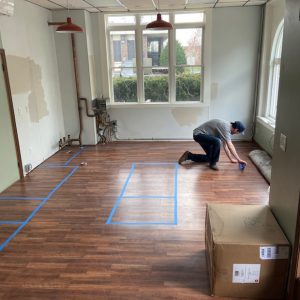
Rebecca Hart (2nd from left) receives a $500 donation from Rita Slasinski (left), Kathy Wallis-McCann (2nd from right), and Kathy Mochak of Coldwell Banker in Westfield at the end of June. (Photo by Peter Currier)
WESTFIELD- The Westfield Food Pantry board announced this week they cleared the $10,000 donation hurdle they needed to continue operating for FY20.
The Pantry sought extra donations at the end of June and beginning of July to cover operating costs, including rent and electricity for the Meadow Street building.
Director of the Westfield Food Pantry Rebecca Hart said in her 10 years working there, they have never been put in the position where they were unsure if they had a sufficient budget for the coming year. Hart cited the recent changes to the federal tax code as one reason for the initial struggle.
“The biggest reason for our shortfall is the loss of corporate donations due to a change in the tax code,” said Hart. “Since President Trump’s critical change to charitable giving was made, our donations have not been the same.”
She noted that the change in the tax code gave individuals and corporations less incentive to make charitable donations.
A GoFundMe page was set up to allow people to donate online. The page received just under $1,500 in donations, but that left an $8,500 shortfall for the next 12 months. Hart said that after some press coverage and publicity, donations began coming in the form of checks and food at a greater rate than before.
The donations came from a mixture of corporations and individuals, although there were far more individual donations. Hart noted that they received two separate checks of $1,000, while the rest of the donations were for smaller amounts that added up quickly. Ultimately, they ended up getting $9,800, $200 short of their goal. However, Hart said that some individuals set up a system to give monthly payments, which should cover the goal for the rest of the year.
Hart said that she does not plan on the food pantry being in this position ever again. To ensure that does not happen, she said she set up a grant for next year to cover some of the costs.
“We are going to keep raising money through grants, fundraisers, and more publicity,” said Hart, “I don’t think people realize how much we rely on donations to make our rent and pay the bills.”
One of the biggest expenses for the pantry is insurance. They often take food from local grocery stores who would have thrown it out otherwise at the end of the day. The result is higher insurance costs, because the pantry assumes all liability if someone gets sick from eating food they received from a grocery store.
Other expenses include the electricity costs for the walk-in refrigerators and freezers the pantry uses for perishable foods. One of the refrigerators ended up needing repairs in the last year, costing the food pantry about $4,500.
Hart had previously been informed that HUD (Housing and Urban Development) federal funding for the 2020 fiscal year is $1,400 less than FY2019, which made their previous lack of funding worse.








